The Lawmatics Blog
Insights on legal marketing, automating the law practice, and legal tech in general
Law firm automation is the practice of centralizing and deploying repetitive, everyday administrative tasks at scale. It achieves this by linking every step of the client journey in one system to automate task triggers, emails, population forms, and reminders.
Legal workflow automation software like Lawmatics doesn’t replace attorneys but enhances them. It integrates with tools like Clio, MyCase, and PracticePanther for full workflow visibility.
Benefits of Legal Workflow Automation for Attorneys
Improved client intake speed and accuracy
Lawyer automation (or attorney automation) tools eliminate manual data entry and automate repetitive tasks at every step of intake, from confirming form submissions to client relationship management (CRM) data entry.
By automating processes like follow-up messaging and scheduling, teams can ensure faster responses and fewer client drop-offs.
As just one example, Lawmatics’ new QualifyAI tool automatically scores and prioritizes incoming leads based on engagement and case fit. This empowers teams to achieve an instant response time.
QualifyAI (and all other Lawmatics tools) is built on trusted internal workflows that help standardize processes and capture complete client information every time.
Reduced human error
Humans are, of course, essential to the operations of any legal practice, and that’s not changing any time soon. But law firms are busy environments, and in all the hustle and bustle, even the most skilled workers can make mistakes.
Legal workflow management software replaces manual document handling and repetitive data entry with automated templates and workflows. This prevents costly miscommunications and prevents tasks from falling through the cracks.
Automated task assignments and reminders also help prevent missed deadlines. For example, Lawmatics enables data sync across multiple systems, including Clio and MyCase, which further reduces inconsistencies.
Centralized data and transparent reporting
Legal practices should keep client data, communications, and metrics in one dashboard to prevent silos. Such centralization also gives managing partners visibility into firm performance and pipeline health in real time. Team members can make big strategic decisions with clarity.
Lawmatics comes with custom reporting tools that make it easy to tie marketing and intake directly to demo requests and revenue.
Streamlined follow-up and client communication
Strong client communication is at the heart of any successful legal team.
Legal workflow automation software allows teams to maintain consistent client contact through automated follow-up emails, reminders, and nurture sequences. With this set up, prospects remain engaged from first inquiry through signed retainer without laborious manual interview.
Lawmatics’ comes with built-in features, like text messaging for law firms, that allow teams to talk to clients and ensure no lead goes untouched.
Increased capacity without adding headcount
Labor costs are among the biggest concerns for a law firm. By automating tasks, law firms can scale their operations efficiently, handling more matters without expanding staff.
QualifyAI from Lawmatics empowers teams to convert more clients with less effort by routing qualified leads directly into workflows.
Lawmatics connects intake, CRM, and drip email marketing software for lawyers. This allows small firms to operate like large ones, using predictive insights that drive faster growth.
Core Legal Workflows Lawyers Can Automate
Legal document automation software has the potential to transform every essential task.
Client intake
Thanks to the large amounts of paperwork that it demands, the client intake process is the most lengthy part of any client lifecycle. Teams who use software can save time with automated intake forms, e-signatures, and data that syncs directly within the CRM.
Lawmatics’ built-in intake automation capabilities connect to follow-up workflows. Teams can save the effort involved in tracking down every client, sending reminders about pending documents like retainer agreements, and manually scheduling next steps.
Through QualifyAI, Lawmatics uses AI-powered lead scoring for law firms to accelerate intake by prioritizing the highest-value prospects first.
Marketing & follow-up
Firms that want to move beyond word-of-mouth client acquisition often spend a significant budget on marketing. Automation software can help reduce these costs by increasing conversation rates and decreasing acquisition costs through triggered drip campaigns, SMS updates, and personalized nurture sequences.
Lawmatics automates all of these processes within one unified dashboard. It makes it easy for teams to assess their marketing return on investment (ROI) at a glance. In turn, they save time and effort on reporting as well as on managing campaigns.
Case Management & communication
Clients who receive an exceptional experience are more likely to turn into promoters. However, firms chasing this exceptional experience can’t afford to miss deadlines or go radio silent during a retainer.
Lawmatics offers task reminders, automated deadlines, and document workflows to make sure every client feels cared for and prioritized. It can even sync with Clio and MyCase to ensure firm-wide synchronization.
Time tracking & billing
Billing and time tracking is an essential part of any law firm’s practice. If invoices are inaccurate, it can have implications on overall company margins,revenue, and reputation.
Lawmatics’ time-tracking tools link directly to invoicing systems, giving firms visibility into productivity and client value per matter. It empowers teams to make strategic, data-driven decisions about internal staffing needs and how to allocate capacity across clients.
5 Steps to Legal Workflow Automation
Law firm automation doesn’t happen overnight, but the process itself is generally straightforward and easy. Here’s how to make it happen.
Step One: Map your current legal workflows
To identify whether your team is a good fit for attorney automation, begin by mapping your legal workflows as they currently exist.
Then, either individually or together as a team, try to identify bottlenecks in intake, communication or billing. Based on the gaps you’ve identified, start writing possible solutions to those gaps. This will give you a list of which features to look for in a tool.
Step Two: Select the right legal workflow automation software
There are many automated legal platforms available on the market. While you’ll want to look for ones that provide the features you’ve indicated in Step One, there is another important factor to consider.
Look for a solution that integrates with your current tech stack. This ensures you can maintain the current operations that are working for you and discard those that aren’t.
Step Three: Start small with high-impact automation
Automation is powerful and, as a result, should be used carefully. It can be tempting to automate everything at once, but this can be quite overwhelming for a team.
Start with one process. Client intake automation is a great place to start. Then, measure results. If you see a positive change, you can move on to the next automation.
Step Four: Train your team for adoption and success
Law firm success depends on the output of the whole team. You need everyone on board in order for your automation efforts to be successful.
The best way to set your team up for success is by providing clarity and templates where possible. Most automation software is easy to learn. But, it can be helpful to go with a system that offers dedicated support in the first few months.
Step Five: Monitor and optimize your automated workflows
There are a few important reasons to monitor and optimize your automated workflows:
- To make sure everything you’ve implemented is serving both the team and the client.
- To make sure you’re receiving a great ROI from your software.
Lawmatics comes with a built-in reporting dashboard that makes it easy to track efficiency gains. Request a demo to see how Lawmatics can help you automate your specific legal workflows.
Common Legal Workflow Automation Challenges and How to Overcome Them
Lawyer automation software is generally simple to implement with amazing returns. However, it’s best to be aware of the possible challenges before you start an engagement. Here are some of the most common issues that law firms run up against:
- Fear of disruption: Fear of change is normal, and if change is associated with disruption and discomfort, the fear can be even worse. It can be hard to sell change-resistant teams on a new tool, especially if they think it’s going to make their job harder.
- Integration fatigue: Most teams have been through countless tools, which means multiple logins and multiple opportunities for headaches. It can be hard to sell a team on a new tool if they don’t truly believe it will make their lives easier.
- Inconsistent workflows: If a team is working on a shaky workflow foundation, it can be hard to know where to begin with automation.
Lawmatics answers all of the above concerns by unifying legal CRM software, automation, intake, and analytics in one easy-to-use platform. Plus, Lawmatics integrations connect with the software your team already uses every day, reducing the time your team spends juggling different systems.
The Future of Legal Workflow Automation: AI-Driven Efficiency
The next wave of legal workflow automation isn’t just about triggering tasks. It’s about software that can anticipate what needs to happen next.
With modern AI workflow automation, your systems can spot patterns in client behavior, score new inquiries, and trigger the proper follow-ups automatically—without adding more work to your team.
That’s where Lawmatics’ QualifyAI comes in. Built directly into Lawmatics' legal CRM, QualifyAI is a sophisticated lead-scoring automation engine designed specifically for law firms. Instead of treating every inquiry the same, it:
- Analyzes client behavior (form submissions, email engagement, response times).
- Reviews communication history and intake answers.
- Interprets engagement signals across your marketing and intake touchpoints.
From there, QualifyAI automatically ranks leads based on fit and intent, so your team knows exactly who to call first.
The benefits are immediate:
- Saves time qualifying leads by replacing manual gut checks with consistent, data-driven scoring.
- Prioritizes high-value clients, ensuring your best opportunities get a faster, more focused response.
- Improves marketing ROI by connecting campaigns and channels to the leads that actually convert.
By pairing AI-driven lead scoring with automation across intake, communication, and reporting, Lawmatics is helping firms move from reactive to truly proactive operations. It’s a clear example of how AI doesn’t replace attorneys—it gives them better information, faster, so they can make stronger decisions.
As AI continues to advance, firms that embrace data-driven workflows will gain a lasting edge: fewer bottlenecks, more predictable growth, and a practice that runs as intelligently behind the scenes as the lawyers who lead it.
Transform Your Firm’s Legal Workflow with Lawmatics
Automation isn’t just about convenience for staff. It’s one of the most reliable ways for law firms to increase profitability and deliver a stronger client experience.
By removing repetitive manual tasks, firms can operate with more consistency, more speed, and far fewer administrative bottlenecks.
Lawmatics makes this possible by streamlining every workflow from initial intake through engaging repeat clients. Its unified system gives firms complete transparency into what’s happening at each stage of the client journey.
Backed by real-time legal analytics and reporting tools, it helps teams make confident, data-driven decisions. QualifyAI pushes these gains even further, giving firms predictive insight into their best opportunities. This way, they can prioritize the right clients at the right moment.
Request a demo to see how Lawmatics transforms legal operations.
Frequently Asked Questions
How can automation help my law firm?
Automation increases efficiency, reduces human error, and helps firms scale without hiring more staff. It frees attorneys from administrative work so they can focus on strategic, billable client work.
What legal tasks can be automated?
Tasks like client intake, document generation, follow-ups, billing, scheduling, and marketing outreach are all strong candidates for automation.
Is legal workflow automation only for large firms?
Not at all. In fact, small and midsize firms often stand to gain the most from automation.
Large firms may use enterprise systems to streamline complex, multi-department workflows. Meanwhile, smaller firms may rely on automation to offset limited staff, improve consistency, and scale client intake without adding headcount.
How does Lawmatics support automation?
Lawmatics combines CRM, client intake, and a legal marketing automation platform into one. The whole platform is supported by QualifyAI, which automatically scores and prioritizes leads for faster response times.
Will automation replace lawyers?
No. Automation handles repetitive tasks so attorneys can focus on legal strategy, client relationships, and work that requires human judgment.
Why automate legal workflow processes?
Automation saves time, reduces errors, and creates consistent, streamlined workflows. It helps firms boost productivity, enhance client satisfaction, and scale without expanding staff.
The world of email is in flux. Big players like Gmail and Yahoo are making bold moves to help crack down on spam, strengthen security, and clean up messy lists. Check out their official announcements here (for Google) and here (for Yahoo).
What does this mean for you as a sender?
First and foremost, don’t panic! These changes don’t formally roll out until February 2024. It’s also worth noting that if you’re a Lawmatics user who regularly sends email through our platform, chances are you’re already compliant with most (if not all) of these requirements.Additionally, though they may create a bit of a headache as bulk senders pivot to comply, it’s important to note that these changes ultimately mean:
- Better security
- Less spam - both in your inbox and in your complaint rates
- Enhanced trust with your clients and subscribers
- Higher deliverability and engagement
There’s a lot to unpack here; in this article we’re going to specifically focus on authentication. In the coming months, emails failing to meet essential authentication standards will face a significantly higher risk of being blocked or sent to spam.
How do you make sure your emails are secure enough for mailbox providers to accept your mail?
Over time, the email world has developed three primary authentication protocols to secure your messages: SPF, DKIM, and DMARC.Does that sound like a bunch of nonsense to you? No worries, let’s break it down:
SPF, or Sender Policy Framework
SPF is a foundational measure to combat email spoofing and phishing. It works by allowing domain owners to specify which IP addresses are authorized to send emails on their behalf.When receiving servers get an email, they check if it comes from one of these authorized IPs. If not, the email might be treated with suspicion or outright rejected.TL;DRSPF is like the guest list at an exclusive event. If your name (or IP address) isn't on it, you're probably not getting in.
DKIM, or DomainKeys Identified Mail
DKIM is a cryptographic approach to email authentication. It provides an encryption key and digital signature that validates an email message was not tampered with during transit. When an email is sent, it's signed with a private key. On the receiving end, the ESP uses a public key (published in the sender's DNS records) to verify the email's integrity.TL;DRDKIM is like a secret handshake. If any part is wrong, you can immediately tell something's amiss with the sender.
DMARC, or Domain-based Message Authentication, Reporting, and Conformance
Of course, there are always ways to bypass the guest list. Perhaps you try the back door or wear a disguise. Same thing goes for a secret handshake; no matter how complex it is, there’s always the possibility that someone has discovered how to mimic it well enough to avoid raising suspicion.That’s where DMARC comes in: it builds on SPF and DKIM to ensure that legitimate emails are properly authenticated against set policies and any failing emails are blocked or moved elsewhere, instead of the recipient's inbox.TL;DRDMARC is akin to a security protocol at a post office. When a suspicious package comes in, there's a clear procedure to follow. If the name on the package doesn’t make sense or there’s an invalid barcode, that letter won’t be delivered. Similarly, DMARC uses SPF and DKIM to verify an email and decide the next steps for its delivery.
Email authentication and Lawmatics
How does this work with Lawmatics? To give you a more secure email experience, we’ve integrated these protocols wherever possible on your behalf.When you validate a sending domain in your Lawmatics account, we automatically implement SPF and sign emails with DKIM using your domain. As long as the DNS records you’ve added to your domain are correctly in place, your emails are being sent in a secure, authenticated fashion and are likely to safely reach the inbox.Because DMARC functions at the domain level, we’re not able to enact it on your behalf. It can be a complex process, sometimes requiring third-party vendors and a significant resource investment to reach the ultimate goal. The peace of mind and added protection is invaluable but implementation often varies based on business needs or restrictions.
Getting started with DMARC
The benefits of DMARC, especially for those in the legal industry, are substantial. It allows you to take control of the messages sent from your domain and prevent bad actors from sending fraudulent or malicious emails on your behalf. Think of it as a customizable tool in your security toolbox; an apt comparison here would be a surveillance camera.Although it can be tricky to fully implement, I highly recommend setting up at least a rudimentary policy. That might look something like this:
v=DMARC1; p=none;
The “v” value refers to the version of DMARC being used, in this case DMARC1. The “p” value refers to the policy you have set, in this case none. If you were to hire a DMARC consultant or an IT firm to do this on your behalf, a p=none policy is often the first step they’ll have you take.Because it’s set to none in that example, none of your outgoing mail is rejected, but – if you decide to add a reporting address to your DMARC policy – you’re able to gain insight into what mail is being sent from your domain and develop a strategy for managing it. That might look something like this:
v=DMARC1; p=none; rua=mailto:dmarc@insertyourdomainhere;
The “rua” value specifies the email address that these aggregate reports will be sent to. Be aware that if you choose to include reporting in your DMARC policy, it’s a good idea to use a dedicated email address or one that will allow you to easily filter out reports. They can generate high volume and quickly overwhelm your inbox if you’re not careful!Working towards implementing DMARC even with a basic policy like the examples above is a great way to signal to your clients and mailbox providers that you prioritize security and trust. There are a ton of resources that can help you get started and our team is always happy to point you in the right direction or provide support.
Up next
Stay tuned for our next installment where we’ll dive into some of the various threats and vulnerabilities out there that can affect your deliverability – and what steps you can take to mitigate them.Have a question or want to share an experience? We'd love to hear from you! Reach out to us at mail@lawmatics.com.
Yes, legal software typically includes AI tools that legal professionals can use to create legal documents. In fact, legal AI tools can be used in multiple ways in the legal industry – as long as they are leveraged correctly.
How is AI used in legal technology?
Artificial Intelligence (AI) is increasingly used in legal technology to streamline processes, improve efficiency, and enhance decision-making for attorneys. Here are just some of the ways AI is currently in use in the legal industry:
- Client intake. AI makes it easy for firms to create their own intake process and efficiently capture client information with client intake form templates.
- Legal research. AI helps legal professionals find relevant case law, statutes, and precedents by searching and summarizing vast legal databases.
- Workflow automation. AI automates routine tasks with visual pathways, step-by-step templates, time-triggered client action campaigns, and segmented follow-up messages.
- Legal marketing. AI allows law firms to target potential clients with personalized marketing campaigns based on status, matter type, location, and more.
- Email campaigns. AI-generated email campaigns to nurture and follow up with prospects are necessary for growing law firms.
- E-discovery. AI supports the review of large volumes of electronically stored information (ESI) such as documents, emails, social media content, and other digital data.
- Virtual assistants. AI-driven chatbots and virtual assistants handle routine client inquiries, appointment scheduling, and initial case assessments.
- Due diligence. AI automates the review of financial documents and contracts during mergers and acquisitions to identify potential risks and liabilities.
- Data analytics. AI-powered data analytics tools provide insights by tracking and analyzing the results of campaigns with built-in analytics and reporting tools.
- Regulatory compliance. AI automatically monitors and interprets regulatory changes to help firms comply with ever-changing regulations.
AI provides significant benefits to the legal industry; however, it also raises ethical and regulatory challenges, including concerns about data privacy, bias in AI algorithms, and potentially impacts the employment prospects for legal professionals. As AI technology continues to evolve, it will likely play an increasingly important role in reshaping the practice of law.
What is an example of AI in the legal sector?
AI is reshaping the entire legal industry, and many wonder how far its capacities will extend. Besides the uses mentioned above, other potential uses of legal AI being discussed include:
Is there an AI for legal advice?
Yes, AI-powered platforms and applications, often called legal virtual assistants or legal chatbots, provide legal advice and guidance. They are designed to assist individuals with common legal questions, explain various legal terms, and provide basic legal information and advice. However, AI cannot replace the expertise and judgment of a human lawyer.
Is there a legal AI like ChatGPT?
Although legal software platforms don't necessarily replicate the general-purpose conversational abilities of models like ChatGPT, they leverage AI and NLP to solve specific challenges within the legal industry. For example, in March 2023, CaseText launched its OpenAI-based tool CoCounsel, touting it as the “world’s first reliable AI legal assistant.” Some of the tasks CoCounsel can potentially manage include document review, legal research deposition preparation, and contract review.
Can AI predict the outcome of legal cases?
Predicting legal outcomes can be very valuable since it allows an attorney to decide whether to take a case, how much to invest in experts, or whether to advise clients to settle or litigate. AI algorithms can predict case outcomes and provide insights into legal strategies by analyzing historical case data. In addition, AI algorithms can assist judges in determining appropriate sentences by analyzing factors such as prior convictions and offender profiles.
Is there a legal AI tool you should leverage?
When used correctly, the best AI tools for lawyers will allow them to function more effectively and efficiently. For example, Lawmatics has launched its own artificial intelligence (AI) within the platform, becoming the first legal CRM to offer AI.Known as LM[AI], Lawmatics’ generative text tool is an intuitive and easy-to-use option available to all Lawmatics users. LM[AI] saves valuable time and helps lawyers put their best foot forward by automatically drafting suggested email content.
“
“This is the kind of breakthrough I really needed when I first started my own law practice. As attorneys, a lot of us actually like writing. But none of us like writer's block. With LM[AI], you never have to start from scratch.”
— Matt Spiegel, Esq., CEO and Co-Founder of Lawmatics
Ready to learn even more about what Lawmatics LM[AI] can do for your law firm? Watch our LM[AI] Webinar today.
Automations are key to building a powerful workflow that doesn’t exhaust your human resources – but how does an Automation know when to start and when to end? How does it know which actions should be taken on which items?Welcome to the world of Automation entry and exit conditions. These conditions create Automations tailored to your firm’s unique clientele and sales cycle.In this Deep Dive, you’ll learn how to harness an array of entry conditions to trigger automated workflows, and we’ll explore best practices for utilizing exit conditions effectively. By the end of this read, you'll be armed with the knowledge and tools to craft highly efficient, precise Automations that both save time and increase your firm's productivity.But first, let’s delve into essential background on how entry and exit conditions function in Lawmatics.
Automation entry and exit - the basics
Understanding each component of an Automation is key to building one that truly serves to save you time. Here’s what you need to know about each component and its function.
Automation types
When creating a new Automation, you will be prompted to select the Automation Type. The three options are as follows:
- Trigger: These Automations trigger when the entry condition is met, and will run all the way through unless exit conditions are met.
- Appointment: This type of Automation triggers when an appointment is scheduled, and allows you to create time-relative triggers within the Automation (done by clicking the orange button below).
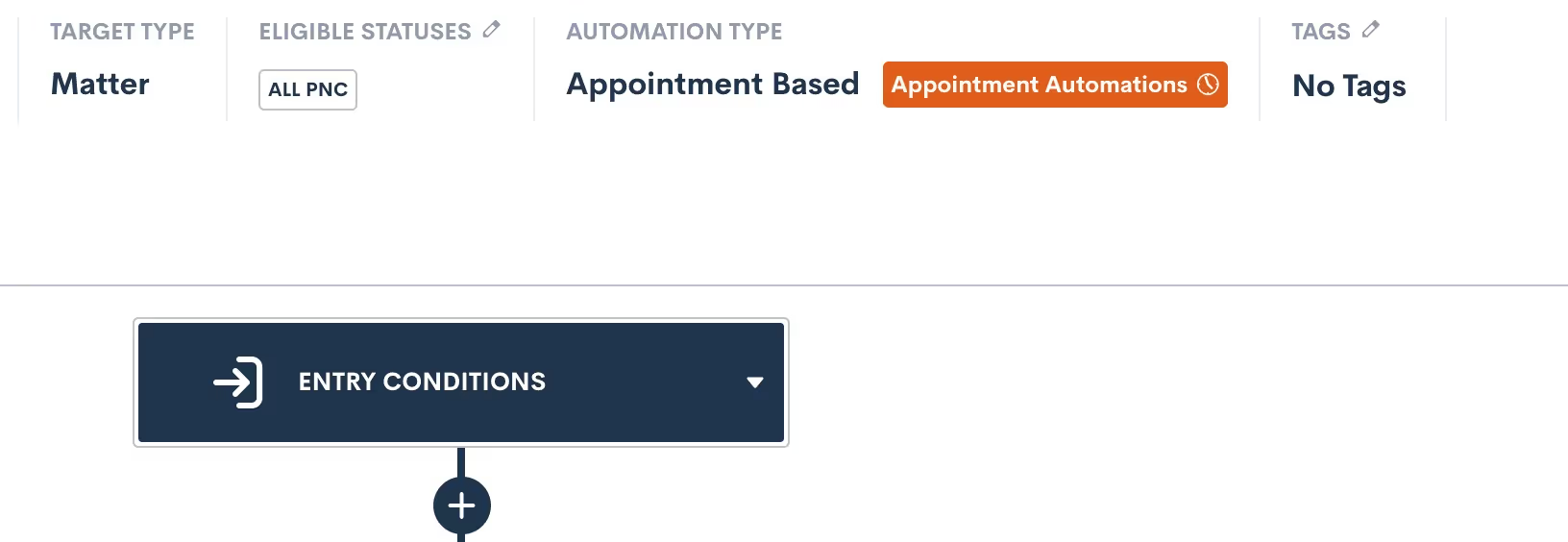
- Date Field: Will trigger when the selected date field is populated for a given matter, and allows you to create time-relative Date Automations, much like Appointment Automations shown above.
These three Automation types determine the manner in which your Automation entry conditions function at the very start of your Automation. We’ll dive further into each of these as we break down all entry conditions later in this article.
Target Type and Statuses
In addition to selecting your Automation Type, you must define whether your Automation will act on Contacts or Matters by selecting a Target Type. If you choose Matter as the Target Type, you must also choose Target Statuses.

For any Automations that are intake or client related, your Target Type will be Matter. Use Contact type for Automations that could run on any contact, such as referral partners, other attorneys, etc.When the type is Matter, you also must select which status(es) can run through this Automation. This is essentially an entry condition in itself, since only Matters of the selected status(es) can trigger the Automation.
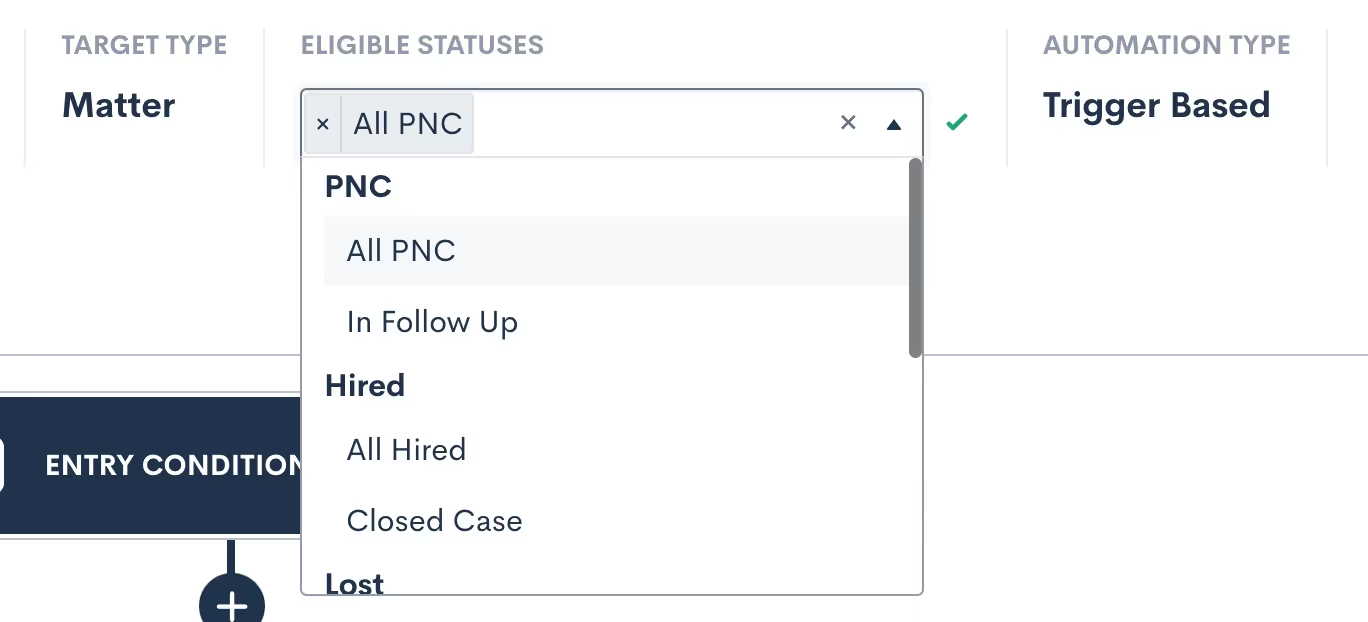
The eligible statuses can also be edited later after you create the Automation. Note: you can select more than one eligible status.
Activating and deactivating
In order to edit an Automation, it must be set to inactive. If you have already activated an Automation and wish to make further edits, simply deactivate it and make your edits. Any targets currently running in the Automation will stay exactly where they are in the workflow while the Automation is inactive, and only resume once it’s reactivated.Deactivating and reactivating an Automation will not cause targets to be re-run through that Automation from the start.When reactivating an Automation, you’ll receive a warning if any Matters who now meet the updated entry conditions will immediately run through the Automation upon activation.

Proceed with caution if you see this message — especially for Automations that you only want applied to new matches moving forward. To skip any current matches, simply click the Future Matches Only options.All Matters will only trigger into a given Automation once, with the exception of our Form Filled trigger (discussed later). While you can manually re-run a target through an Automation, that target will not trigger through the same Automation more than once.
Entry conditions
Entry conditions are arguably the most important part of your Automations, since they determine what will set the workflow in motion. Let’s walk through each available option for entry conditions.
Using multiple entry conditions
As we explore the various entry conditions, note that Automations can be further refined by combining multiple entry conditions with either an AND or an OR relationship.To use multiple entry conditions, first select your first entry rule. Then click the button labeled Add Entry Conditions, to add your second entry condition.
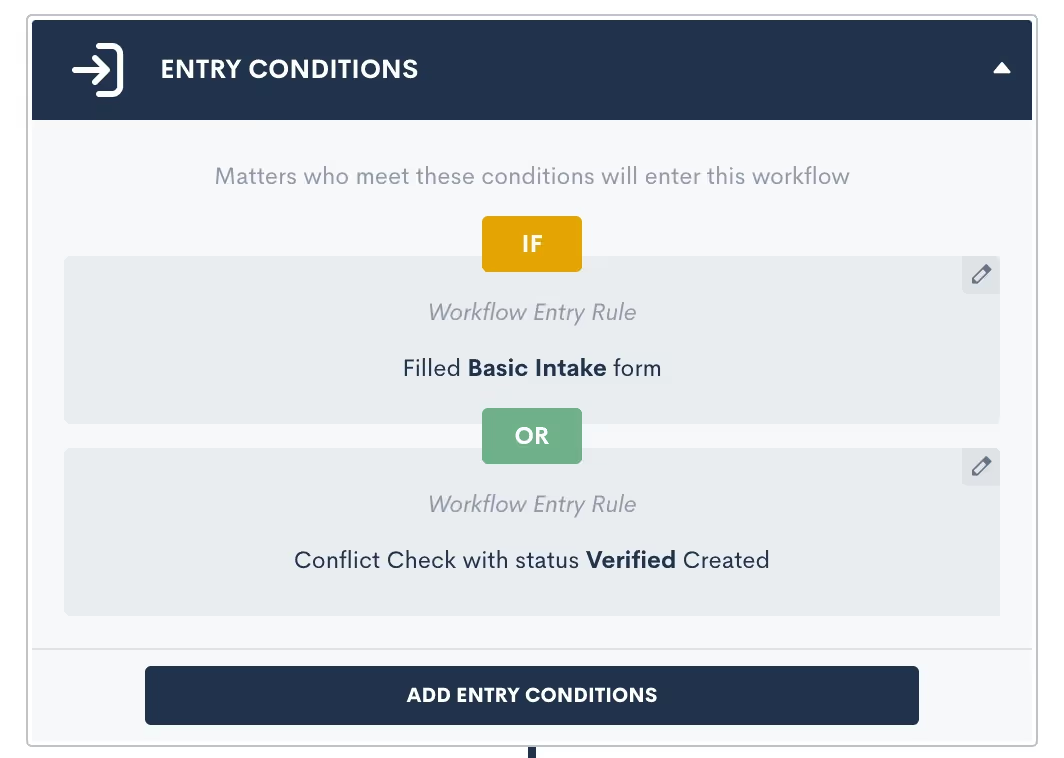
Once you have both (or all) entry conditions entered, simply click where it says OR in the image above to change to an AND relationship if desired.These entry conditions will be honored as they are selected. AND relationships require all the selected entry conditions to be fulfilled, whereas OR requires just one such condition to be fulfilled.OR ExampleA firm has multiple intake forms, one for each of their different practice areas. Once any one of these forms is submitted, an Automation should trigger to confirm the submission and follow-up with that prospect until they schedule a consultation. This Automation should be built with an entry condition for each form linked with an OR relationship.AND ExampleA firm requires a client to both fill out a form and submit a requested file in order to trigger the next action in the Automation. This Automation should be built with two entry conditions – one for the form and one for the file upload – linked with an AND relationship.
Match all
The first option you’ll see for setting an entry condition is also the most encompassing. Since your selected statuses also work as an entry condition, using the Match All entry condition will simply run the Automation on every possible target within the selected type and status.

In the example above, you’ll see that PNC was selected as the only eligible status. This means the Match All option will only match all Matters with the PNC status, and not ones with other statuses like Lost or Converted.While this entry condition can be useful, the most effective Automations are much more targeted.
Registered for event
Lawmatics has everything you need to manage mass events such as seminars, luncheons, and more. This includes the ability to trigger an Automation when someone registers for one of your events.
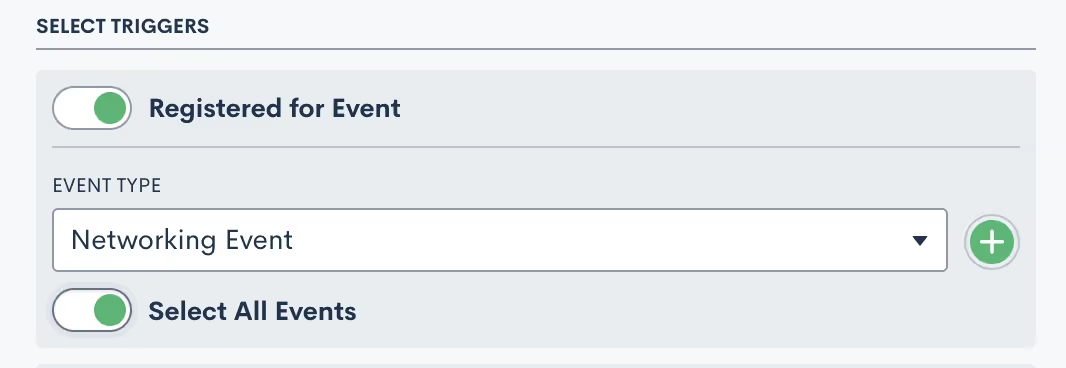
To automate different actions for different event types:
- Choose which event type should be the catalyst for each Automation
- Select a specific event within that type, or toggle Select All Events so that this Automation runs on any events of that type.
Custom email activity
Custom email appointment triggers in Automations are one of the most critical components of email marketing and automation. This trigger allows you to fire an Automation based on whether a specific email has been opened or clicked on (assuming there is a clickable link in the email).

- Select the email that you would like to base this Automation trigger on
- Select whether you want the Automation to trigger on the specific email being opened or clicked on by the recipient
Filled a form
This trigger allows you to select a specific form that, when submitted, will automatically trigger the Automation. If you wish to trigger an Automation on one of two or more forms, this can be accomplished by setting multiple entry conditions with an OR relationship.

As mentioned above, Lawmatics Automations only run once, meaning that if the condition is met multiple times the Automation will only run the first time the condition is met. The Filled a Form entry condition, however, gives you the option to have the Automation run every time the selected form is filled out.

If the latter is selected, then any given Matter will run through the Automation each and every time the selected form is submitted.
Requested files
Lawmatics file requests are a valuable tool, allowing you to easily send out templated file requests to your Matters. Use this entry condition to trigger an Automation based on the status of a particular File Request.

- Select a File Request template to base this Automation trigger on
- Select whether you want the status of the File Requested to be (IS) or not to be (IS NOT)
Note the following three status options:
- Pending: the File Request has been sent but no files have been submitted
- Submitted: some files have been submitted but not all the requested files.
- Completed: all requested files have been uploaded
Most commonly you will trigger an Automation when the status of a file request is Completed.
Signed a document
Lawmatics allows you to create an Automation trigger based on the signing of any particular e-signature document. A great example of this is fee agreements or retainers. Simply send one to a new client for signature, and then have an Automation that would only trigger once all parties have signed that fee agreement.

Select the document type, and then the specific document. Remember that you can always use multiple entry conditions to create an OR relationship with multiple documents.
Appointment created
When you use this trigger the Automation will become an Appointment Automation, discussed earlier in our Automation types. You can select this Automation type when you are first creating an Automation, or simply select this entry condition when choosing your trigger and it will change to that type automatically.

Appointment Automations allow you to create time relative Automations based on the date and time of your appointment. For example, you can trigger an Automation "one day before" or "two hours after" the appointment.The parent Automation (the part shown above) will trigger at the time the appointment is scheduled, whereas the Appointment Automations (shown below) will trigger based on their relative time selection.

Note that the Appointment Automations are activated and deactivated independently of the parent automation. If an appointment is rescheduled or canceled, the Appointment Automations will update accordingly.
Invoice paid
This entry condition is only available if you are using LMPay, Gravity Legal, or if you have a LawPay integration connected. This entry condition allows you to trigger an Automation when an invoice has been paid.

Task activity
While you can of course assign Tasks as an automated action, you can also trigger an Automation when a particular type of Task is either created or completed.

Select whether the creation or the completion of the Task should trigger your automation, and then select from your Task tags to determine which tag should trigger this specific automation.
Conflict check
Conflict checks are often a crucial part of your intake, so you may consider triggering an Automation based on the status of one of these checks.

Choose to create this entry condition when a conflict check is either Denied (conflict detected), Undecided (needs manual check), or Approved (no conflict). You may even end up creating a complete workflow where one Automation performs the conflict check, and another triggers upon the passed or failed check.
Match on fields
Last but not least, the Match on Fields trigger is one of the most powerful triggers, allowing you to create an entry condition based on the value of any fields in your CRM database.
- Select the target field. It’s common to use fields like Practice Area, pipeline stage (Stage), or Status with this trigger.
- Choose which condition should be evaluated
- Pick the value you are seeking a match on
The condition options will change depending on the type of the field that you select as your target. For example, a list type field will have Equals or Not Equals as condition options, whereas a number field will have Greater Than, Less Than, and other such options.
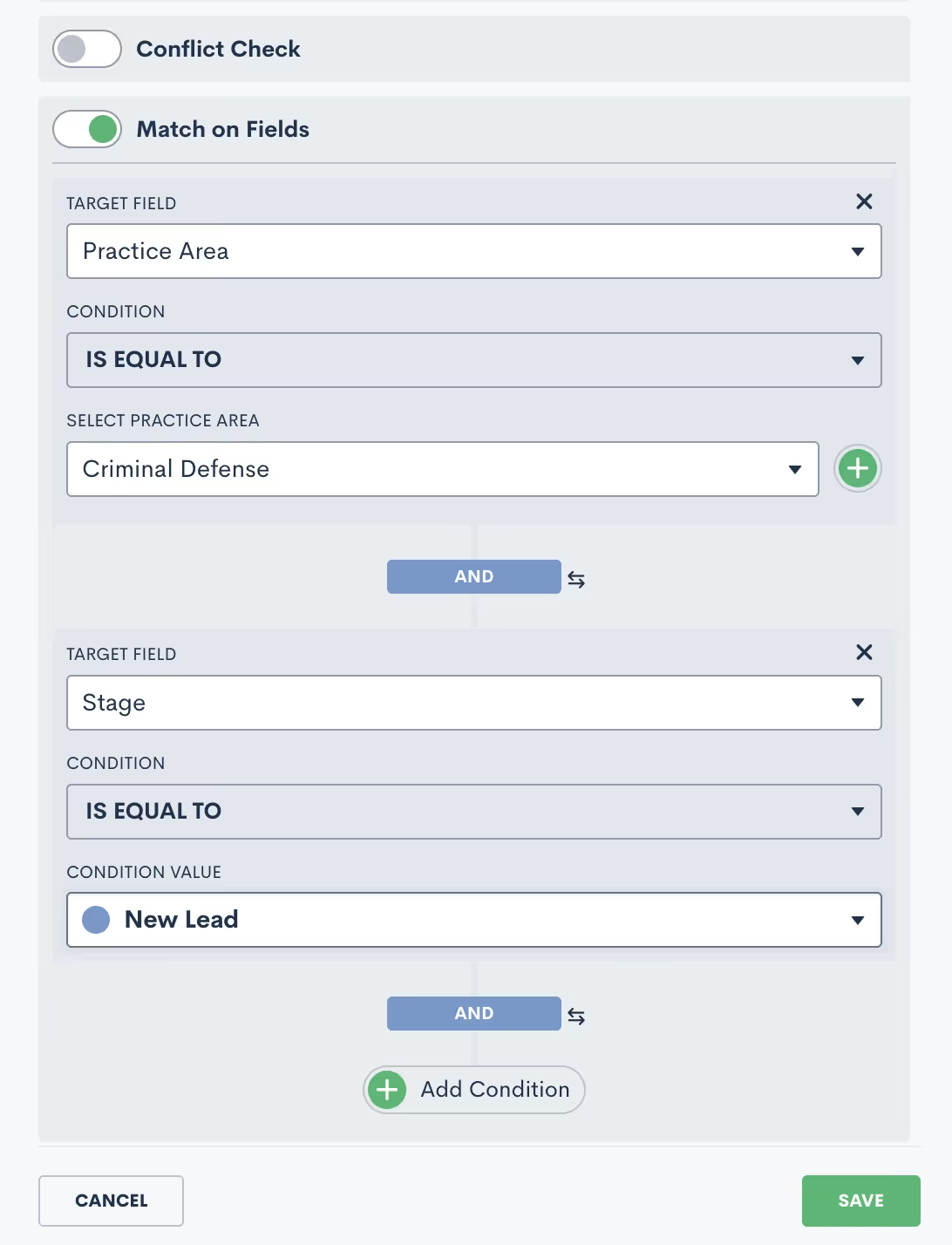
The Add Condition button allows you to add multiple conditions to the matching trigger, as shown in the image above. You can also give these conditions either an AND or OR condition. In the image above, you will see that they have an AND relationship. To change to OR, simply click on the word AND, and it will switch to OR.
Exit conditions
Guess what – the options for exit conditions are exactly the same as those for entry conditions!

While we won’t go through them all again, just remember that any of the conditions described above that can trigger an Automation are essentially used the exact same way to “trigger” a target to exit an Automation.ExampleWhile a filled form could be used to initiate an Automation, that exact same condition may be used in a different scenario to exit a target from the Automation. You might use this to stop an automated sequence of follow-up emails after a client has submitted the information your firm requires.As you set your Automation exit conditions, simply think of them as “triggers” in reverse.Exit conditions are checked at the start of each action in your Automation. If you happen to have an Automation with long time delays, the exit conditions are not taken into consideration while the target is within that delayed period.Instead, the exit condition will be checked once that time delay has run its course and the target starts to enter the next action in the Automation. At this point, that next action will not be run if the exit condition is met and the target will exit before any further actions occur.That being said, you typically want to select exit conditions that are more of a permanent condition rather than something static that may change by the time the next action is reached.
Exit vs. If/Else Conditions
One of the most common mistakes when it comes to exit conditions is to use an If/Else Condition branch instead of exit conditions. Ponder the following example:

The supposed goal of this Automation is to check if a Matter has filled out a form. If they have, we want to change a certain attribute, and if they have not, we want to re-send the form. This is an example of what NOT to do.The way this Automation is built with the If/Else Condition will NOT work. The condition will be checked at the time the target hits this branch in the Automation, not necessarily when the form is filled out.Instead, you need to have an Automation that sends out the form on spaced out intervals, with exit conditions of the form being filled. A separate Automation will trigger when the form is filled to perform the change attributes action. Read more below to see this example of what TO do.
Useful examples
Example: form reminders
When creating an Automation to send out a Basic Intake form (or any other form), your Automation should look similar this:

These actions can be repeated as many times and on any cadence that you would like. As you have the exit condition selected, as shown above, your target will stop getting reminders once they have submitted the form.Remember, if you want something to trigger once the form is filled out, make sure to use the filled form as your trigger for a separate Automation. Don’t try to use an If/Else branch to check for the status of the form.
Example: drip campaign
The same principle applies to creating a drip campaign within an Automation. Your drip campaigns could have any purpose you desire. For example, you may have one prompting a new lead to schedule an appointment, another following up with an old lead that has gone dark, yet another checking in with an ongoing client – or any other scenario you can think of.When it comes to exit conditions for these drip campaigns, you must think about what condition would cause this Automation to no longer be relevant for a given target. In other words, whenever the call to action (AKA the thing you’re trying to get them to do from this drip campaign) is accomplished, they should exit the Automation.The example below shows a hypothetical drip campaign set up to continue sending emails to a matter as long as they are in the New Lead stage of my pipeline.

Since I have set the exit condition to be “Stage is NOT New Lead”, this means that they will exit the Automation once they move to any other stage on the pipeline besides New Lead.
Conclusion
You now have the knowledge and tools to craft highly efficient, precise Automations that will not only save time, but also elevate your firm's productivity. You've gained a deeper understanding of these vital components. You've also learned to harness a diverse array of entry conditions to trigger automated workflows and to utilize exit conditions effectively.With these insights and relevant examples, you're well on your way to becoming an Automation maestro. Create the best possible client experience with Automations, and stay ahead of the curve to transform the way you approach automation in your firm.
Lawmatics is all treat and no trick when it comes to our brand new features, including appointment time zone selections, company matter add-ons, and much more. So grab a pumpkin spice latte and hunker down for this fresh new batch of features.
Simple scheduling for different time zones
Does your firm operate in multiple areas or with remote staff? We've simplified appointment and event coordination for you by introducing a new Time Zone field. Using said field, you can instantly select the appropriate time zone, ensuring that both you and your client don’t miss each other come meeting time. No more awkward rescheduling or mental math for your bookings.
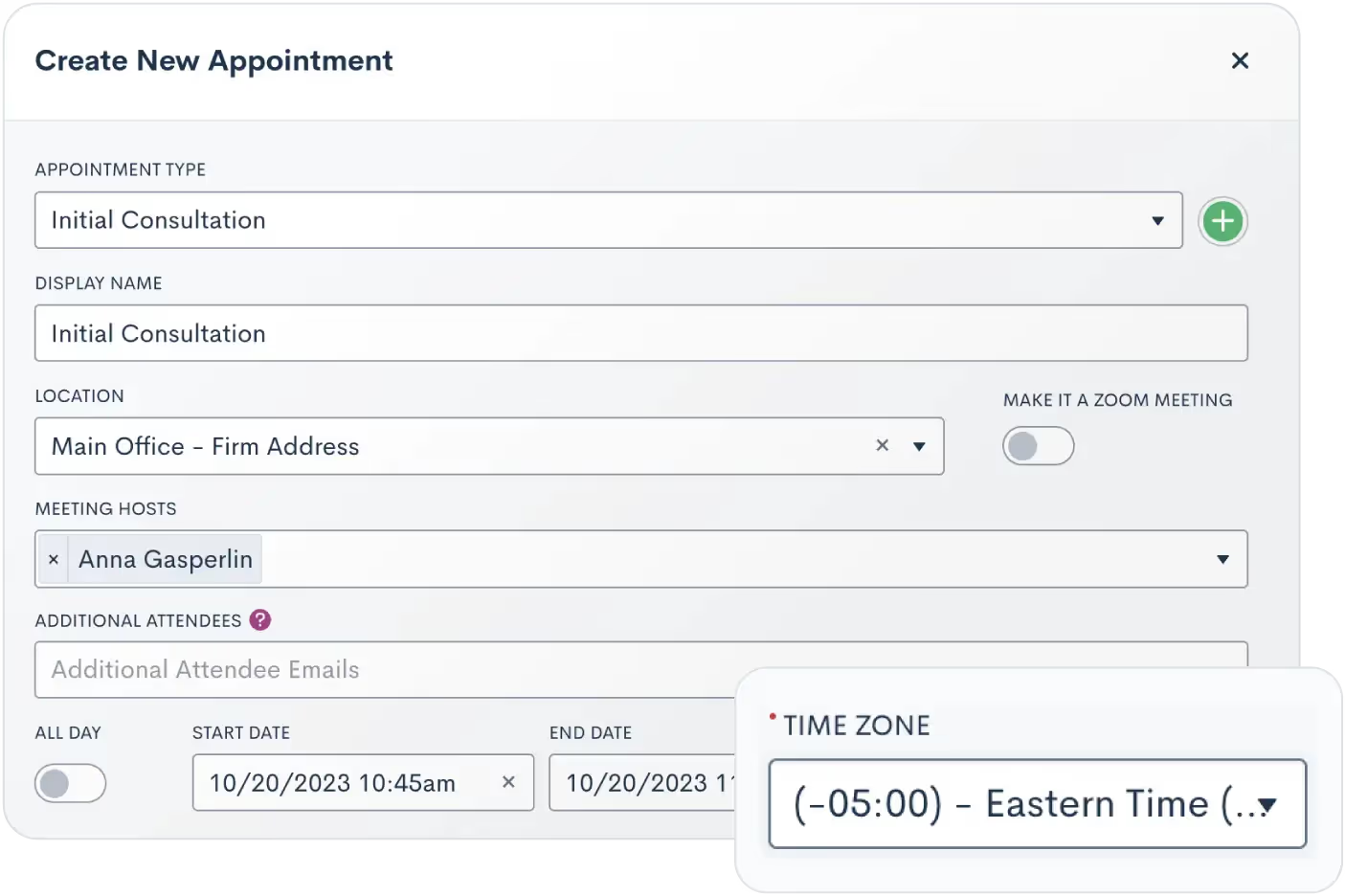
Text clients like an old friend from home
On the topic of regional communication – you can connect with clients in a way that feels personal. Users can now have multiple active phone numbers with varying area codes to send text messages from in Lawmatics. This release is accompanied by a new Firm SMS Number field, allowing you to manually select which phone number to use for each contact.
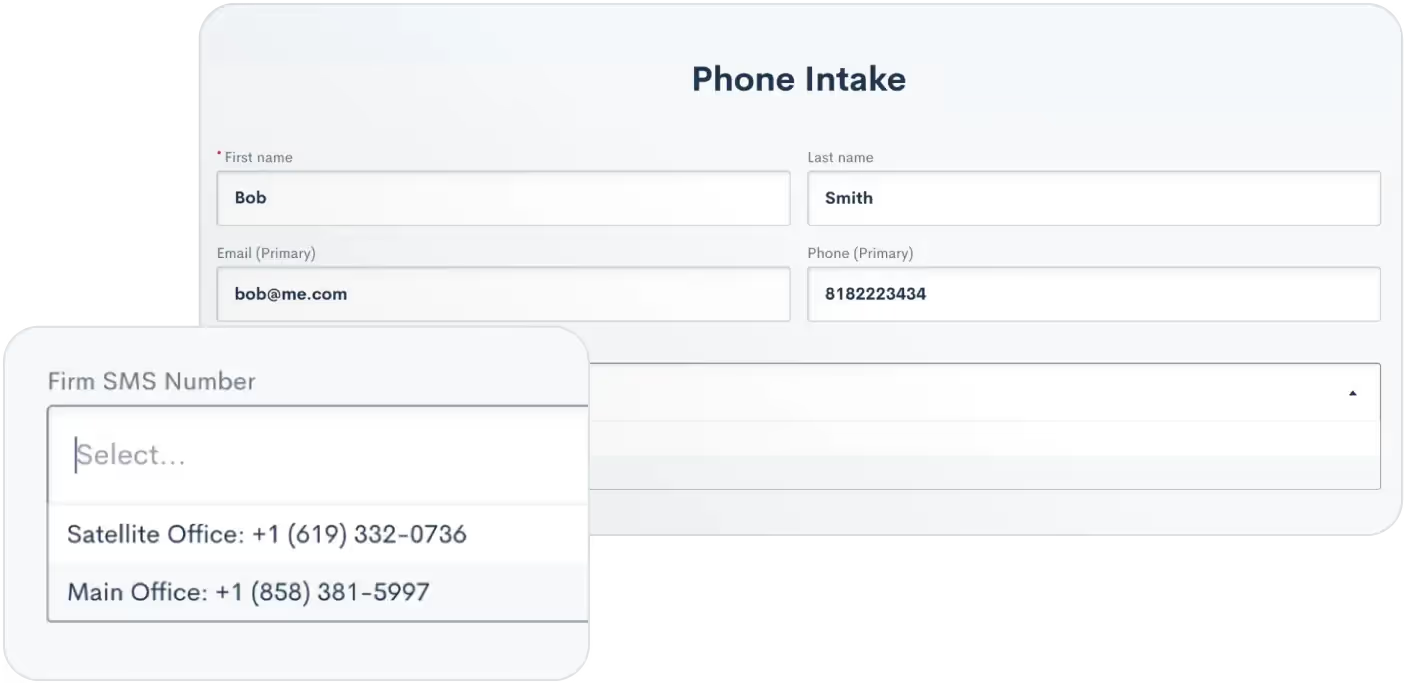
Refine Conflict Checks with multiple search terms
After introducing flexible search terms in our August release, we’re making your conflict check search even more dynamic and inclusive. Users can now use multiple search terms by creating an ‘Or’ relationship. This will include more relevant data in your search by significantly broadening your conflict check results. (Sneak peek: we're already working on adding an ‘And’ relationship for search terms, so stay tuned!)

Build more robust integrations with Zapier
Our new Lawmatics Zapier App enhancements can help you further redefine your workflows. Previously, users were limited to syncing Contacts and Matters through Zapier. Now, we're excited to introduce the syncing of Companies across applications. This update simplifies data management, ensuring uniformity and consistency throughout.

Don’t miss a company contact with new email fallback
Don’t have a personal email address for a Company’s point of contact? Don’t worry. Our system will now default to using the Company's email address for communicating with that Matter. One way or another, your emails always reach their destination. This feature is available for emails sent from the Matter profile, in Marketing Audiences, and also in Automations.
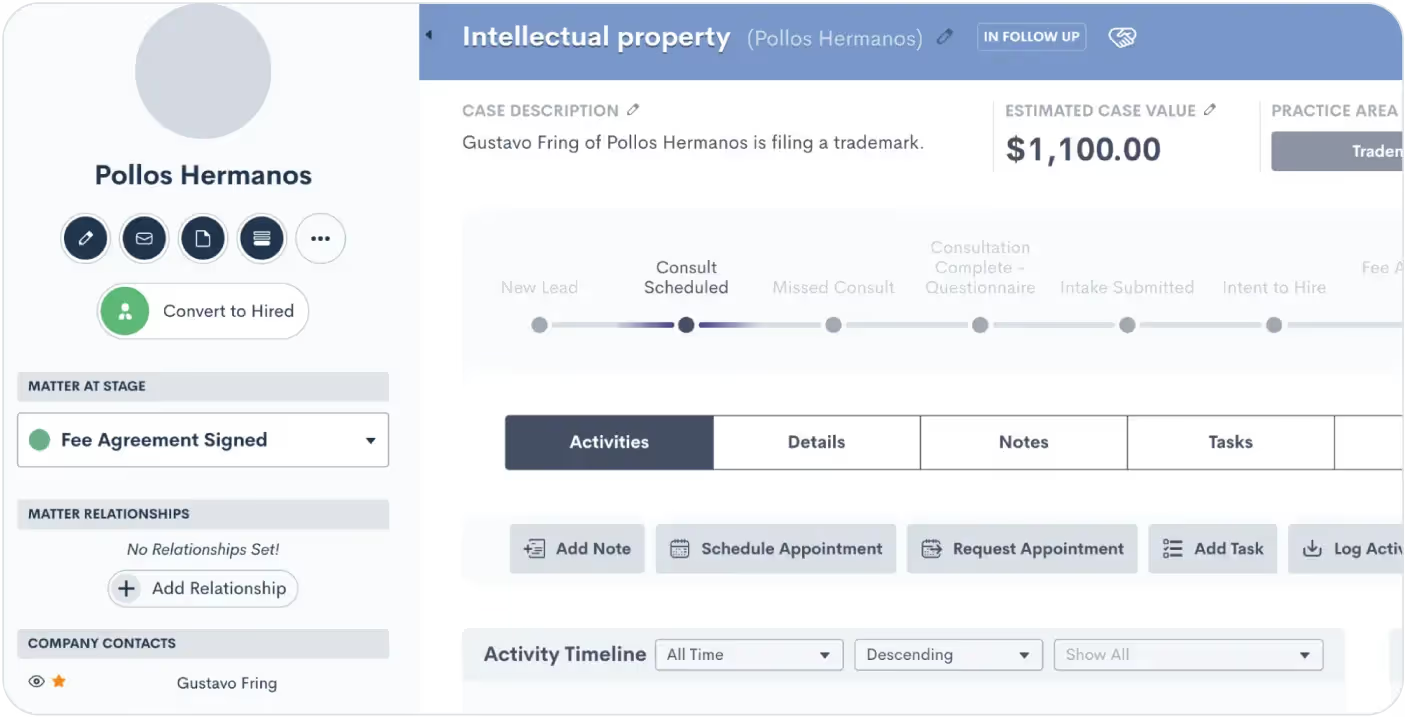
Receipt customization for manual payments
When dealing with a client’s bill, transparency is key. This new update helps our Time & Billing users deliver that transparency. Users now have the option of sending a receipt to the client whenever manually logging an invoice payment. This added flexibility ensures you can cater to the specific preferences and needs of your clientele.
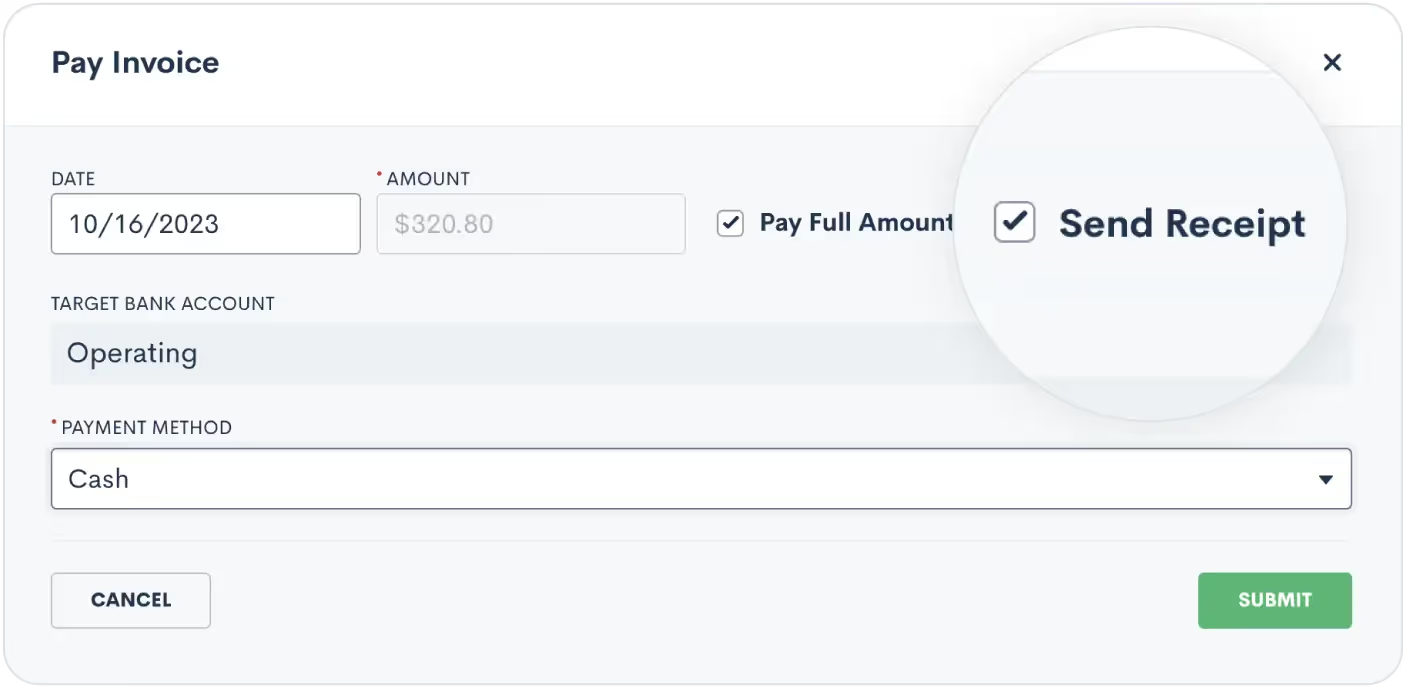
As always, we welcome your feedback and encourage you to reach out with any questions or suggestions. Thank you for being a valued member of our community. Together, we continue to push the boundaries of what's possible for law firms.Sign In or Sign Up to get started with Lawmatics today
More than a resume, attorney biographies introduce the people behind the law firm. A thoughtfully crafted bio acts as a conversation starter, providing a window into an attorney's unique personality and passion for the law.Attorney bios are typically located within the law firm's About page and serve as a great opportunity to establish expertise and forge authentic connections. Generally, the About page is often one of the most visited pages on a law firm's website after the home page. And it's a key destination prospective clients go to learn more about the firm's attorneys, capabilities, and approach.Exceptional bios allow lawyers to effectively communicate their credentials while also highlighting approachability and genuineness nurturing meaningful relationships with clients that drive growth and engagement. Each bio introduces an attorney at the firm and highlights their credentials, experience, and passion for the law. In addition to those details, it may overview the law firm's history, mission, values, and areas of practice.Let’s take a look at how you can improve your law firm’s attorney bios.
Building trust and credibility in the digital age
Prospective clients are looking for more than just credentials (while still looking for credentials), they want to engage with the people at the law firm. This is where compelling attorney bios come in.Far more than a laundry list of accolades, an impactful bio becomes a story. A story that establishes expertise while also highlighting personality and values. The bio provides a platform to move beyond a resume and forge authentic connections. In essence, your bio is an opportunity to turn prospects into clients by connecting through engaging and strategic storytelling. Below are some of the key goals for a good biography.
Showcasing expertise and experience
A biography establishes competence and subject matter expertise. Highlighting credentials like academic qualifications, admissions, years of experience, ratings, certifications, and awards builds confidence. Clients want to assess their skills.For example, an Intellectual Property attorney can showcase:
- Computer science degree from MIT
- 15 years handling patent litigation
- Admitted to practice in New York and California
- AV Preeminent Peer Review Rating from Martindale-Hubbell
- Secured over $20M in infringement verdicts
This quickly conveys niche expertise and an accomplished background.
Connecting through personal details
While credentials are crucial, clients may also want a personal connection with their attorney. You can highlight personal details like:
- Hometown, family, interests outside law
- Passions, motivations, and experiences that shaped their career
- Military service, volunteer work, and charitable causes
Sharing these insights creates rapport. Clients get to know the real person behind the suit.
Converting prospects to clients
An exceptional bio serves as a pivotal conversion tool by compelling readers to take action. Strategic storytelling highlights achievements and expertise while personal anecdotes forge connections. This one-two punch nudges prospects to pick up the phone, submit an intake form, or contact the firm.Specifically, bios can motivate conversions by:
- Establishing subject matter authority and confidence in your capabilities
- Making expertise relatable through real-world examples and client impacts
- Using a warm, welcoming tone that builds rapport
- Providing social proof of results through client testimonials
- Ending with a clear CTA like requesting a consultation
When an attorney's credentials and personality resonate, prospects become clients. An optimized bio guides readers seamlessly through that conversion process.
Communicating firm values and approach
The attorney biography provides an opportunity to highlight the law firm’s values beyond just individual accomplishments. By thoughtfully showcasing community involvement, pro bono work, nonprofit boards, and other efforts, lawyers can illustrate the firm's core values and service philosophy.For example, an attorney bio might mention:
- Leading the firm's efforts to provide free legal aid to domestic violence victims. This communicates a priority on social justice.
- Securing millions in verdicts for small business clients. This conveys an emphasis on supporting entrepreneurs.
- Volunteering with the Innocence Project. This shows a passion for criminal justice reform.
- Chairing local nonprofits and bar associations. This illustrates a commitment to the community.
Through strategic details, readers gain insight into the principles, causes, and beliefs that shape the firm’s culture. They get a feel for "why we do what we do." The alignment between the firm's values and the prospect's own priorities can further drive engagement. Showcasing culture and character helps forge connections beyond credentials.
Enhancing visibility with SEO
With strategic keyword optimization and links to external content, an attorney bio enhances visibility during client searches. This establishes thought leadership presence by improving rankings and visibility in key practice areas. Optimized bios are a great place to link to when the attorney has written articles, been interviewed on podcasts or the news. These backlinks help increase Domain Authority but also can draw prospective clients from other website pages back to the attorney's bio to learn more.
Crafting compelling attorney bios: key elements
An exceptional attorney bio incorporates several critical elements to convey expertise, approachability, and authentic personality.Let’s break down the specific elements and their purpose.
Professional headshot
A high-quality professional photograph makes an immediate visual connection with site visitors. It should project confidence, competence, and authentic warmth. Attorneys should avoid overly stiff, staged photos and instead opt for a relaxed, genuine expression. The goal is to exude polished yet approachable professionalism.
Credentials and honors
Highlighting unique credentials, fellowships, certifications, and honors from reputable organizations helps establish niche expertise.For example:
- Fellow, American Academy of Appellate Lawyers (demonstrates appellate expertise)
- AVVO, Martindale-Hubbell, Best Law Firms (shows accomplishment in legal abilities and client ratings/reviews)
- National Trial Lawyers Top 100 (confirms litigation proficiency)
Pro tip: write out the acronym of associations or sunfamiliar honors that may confuse readers that aren’t familiar with the law.
Specializations and sub-specializations
Conveying focused practice areas and sub-specializations allows potential clients to assess fit.An attorney could showcase:
- Patent litigation with specific expertise in SaaS and blockchain technologies
- Chapter 7 bankruptcy and restructuring for small medical practices
- Concentration in high net worth divorce and complex asset division
This degree of specificity is powerful in competitive markets, especially when connected to client outcomes.
Inspiration and background
Build connection with prospective clients by thoughtfully sharing experiences that shaped their professional and personal journeys. Even small anecdotes about impactful mentors, internships, or childhood experiences can provide insights into passions and motivations.
Relatable insights on client pain points
Strategic bios present opportunities to relatably address common client concerns, fears, and emotions. This displays empathy and commitment to client service.For example, a family law attorney could validate feelings of uncertainty during divorce, or a personal injury attorney can address the feeling of humiliation after an accident.
Links to external content
Links to published articles, media mentions, speaking engagements, and other digital assets enhance subject matter expertise. Choose links selectively to avoid overwhelming readers.
Client testimonials
Specific videos or written testimonials from satisfied clients offer social proof of an attorney's successful track record. Client quotes should detail the attorney's positive impacts on their case and well-being.
Memberships and community involvement
Note professional associations, legal networks, boards, pro bono work, and community organizations. This highlights engagement with peers and dedication to service. Be specific about roles and contributions.
- President, Local Bar Association (demonstrates leadership and engagement with the legal community)
- Board Member, Women's Prison Association (highlights commitment to criminal justice reform)
Clear call-to-action
An effective call-to-action conclusion capitalizes on the bio's momentum to motivate prospects.Some options include:
- A warm invitation to request a free consultation or case evaluation
- Link to contact the attorney directly via email, online form, or phone
- Offer to provide a free guide, checklist, or other legal resource
- Invitation to sign up for a newsletter or connect on social media
- Promotion of an upcoming webinar, seminar, or speaking event
The key is motivating readers to engage instead of just exiting the page. Offering free resources or consultations encourages action.
Crafting compelling attorney bios: proven tactics
Writing exceptional attorney bios requires skill, planning, and collaboration. Follow these expert tips for optimizing impact.
Crafting compelling content
Hook readers immediately by highlighting an impressive achievement, an inspirational background, or an interesting career narrative. This establishes expertise and approachability upfront. Showcase specific legal expertise using concrete examples like case results and settlements.Use conversational language that steers clear of excessive jargon. Find strategic opportunities to naturally incorporate relevant keywords to boost client search visibility. But avoid awkward over-optimization. Maintain an authentic, genuine tone that builds trust. Let facts and reviews speak for themselves.
Optimizing structure
Establish a tone that makes sense for your practice area. Do your clients want empathy, aggression, or professionalism? Find your sweet spot and run with it.While there is some flexibility around word count, it is best to keep bios in the 300-500 words range. This provides enough space to showcase key credentials and accomplishments while maintaining a focused, scannable experience for site visitors. Anything significantly shorter than 300 words may seem too bare-bones and cursory. Anything over 500 words risks losing the reader's attention with excessive detail.
Strategies for consistent yet personalized team bios
When developing bios for a team of attorneys, law firms face a balancing act. Thoughtful collaboration, style guidelines, and creative license help achieve consistency while allowing each lawyer's unique strengths and personality to shine.
Collaboratively develop guidelines
To create a consistent baseline while allowing customization.Firms should involve key stakeholders to define foundational style guidelines around:
- Standard biography structure and sections to include
- Ideal word count or length parameters
- Overall voice, tone, and messaging
- Rules for branding elements like logos, colors, and fonts
Provide creative license thoughtfully
Within collaborative guidelines, attorneys should have reasonable creative license to express individuality. Bios can spotlight:
- Specific credentials, awards, and practice niches
- Tailored client successes, verdicts, settlements
- Community groups and causes personalized to the lawyer
Incorporate personalizing elements
Including unique elements make bios distinctive yet cohesive:
- Personalized headshots
- Links to media mentions
- Video introductions
- Testimonials speaking to working with that specific attorney
Updating achievements regularly
As lawyers grow and accomplish more, bios should be continuously updated to accurately reflect evolving expertise and contributions. Fresh, dynamic content keeps engagement high.
5 examples of real, compelling attorney bios
Now that we’ve covered best practices and tips for optimizing attorney bios, let’s examine how those techniques are applied through real-world examples. Analyzing bios across diverse law specializations reveals tangible takeaways for crafting resonant, trust-building bios.
1Brooks Derrick, Derrick Law Office
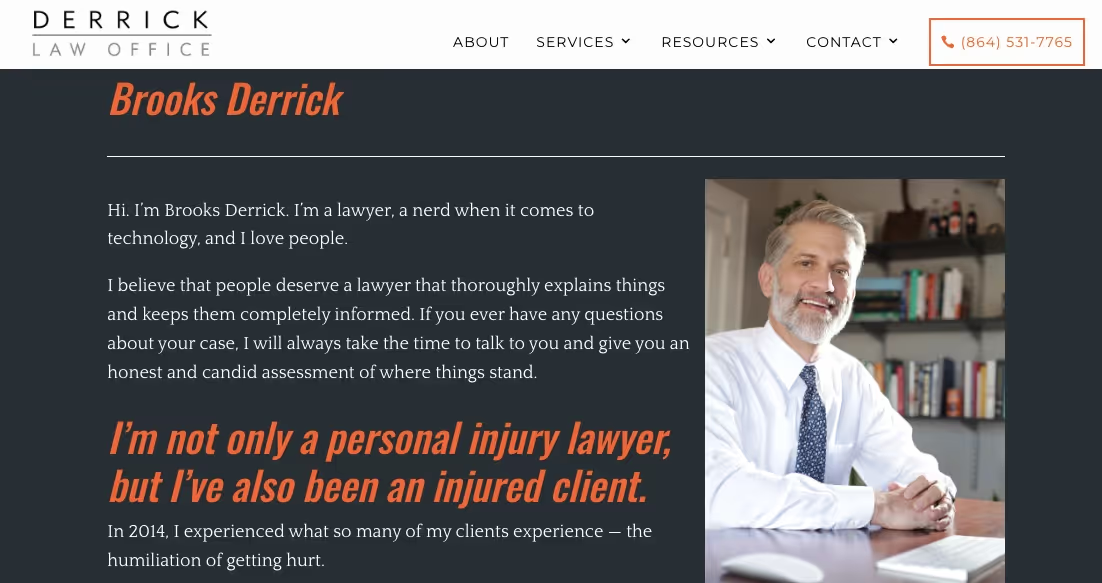
(Image: Brooks Derrick of Derrick Law Office)Derrick Law Office)Over at the Derrick Law Office in Simpsonville, SC, attorney Brooks Derrick starts by introducing himself in a friendly, conversational tone and emphasizing his passion for helping injured clients.Instead of focusing on credentials, Brooks shares an engaging story about personally experiencing a painful slip and fall injury in 2014. Derrick provides specific details about the humiliation, struggle, and long recovery process, showcasing a powerful way to relate to his client's experiences.The expertise derived from his injury experience allows Derrick to guide clients through gathering their strength and getting compensation compassionately. He ends by warmly inviting readers to contact him.Key insights:
- Uses emotion and personal experience to intimately connect with injury victims.
- Details of own injury and recovery establish deep empathy and comfort.
- Positions himself as an advocate who has walked in clients' shoes.
- Earns trust as a reliable, responsible advocate during difficult times.
2Brandon Dixon, The Law Office of Brandon Dixon, P. C.
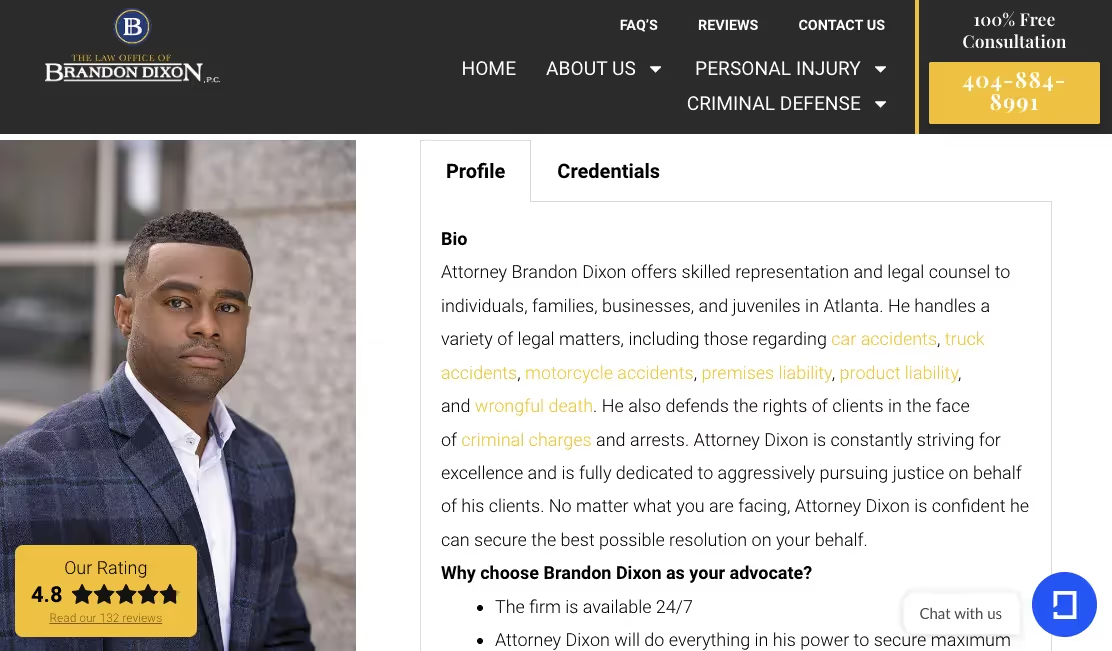
(Image: Brandon Dixon, The Law Office of Brandon Dixon, P. C.)The Law Office of Brandon Dixon, P. C.)Brandon Dixon’s bio of the Atlanta-based law firm, The Law Office of Brandon Dixon, P.C., highlights his focus on personal injury, criminal defense, and representing individuals, families, and businesses in Atlanta. Dixon uses this space to detail the types of matters that his law firm handles like car, truck, and motorcycle accidents, premises liability, product liability, and wrongful death.Something that stands out in this bio is the directness of the section titled “Why choose Brandon Dixon as your advocate?” It lists availability 24/7, fighting for maximum compensation, tireless advocacy in and out of court, free consultations and compassionate support as reasons to choose him. Dixon's bio conveys his constant striving for excellence and dedication to aggressively pursuing justice for his Atlanta-based clients.Key insights:
- Clearly states practice areas and niche specialties upfront, highlighting focus.
- Emphasizes dedication, passion and commitment to clients to build trust.
- Provides reasons to choose this firm/attorney to showcase value.
- Strong call-to-action and free consultation offer motivate conversions.
3Sarah LaRue, LaRue Law PLLC
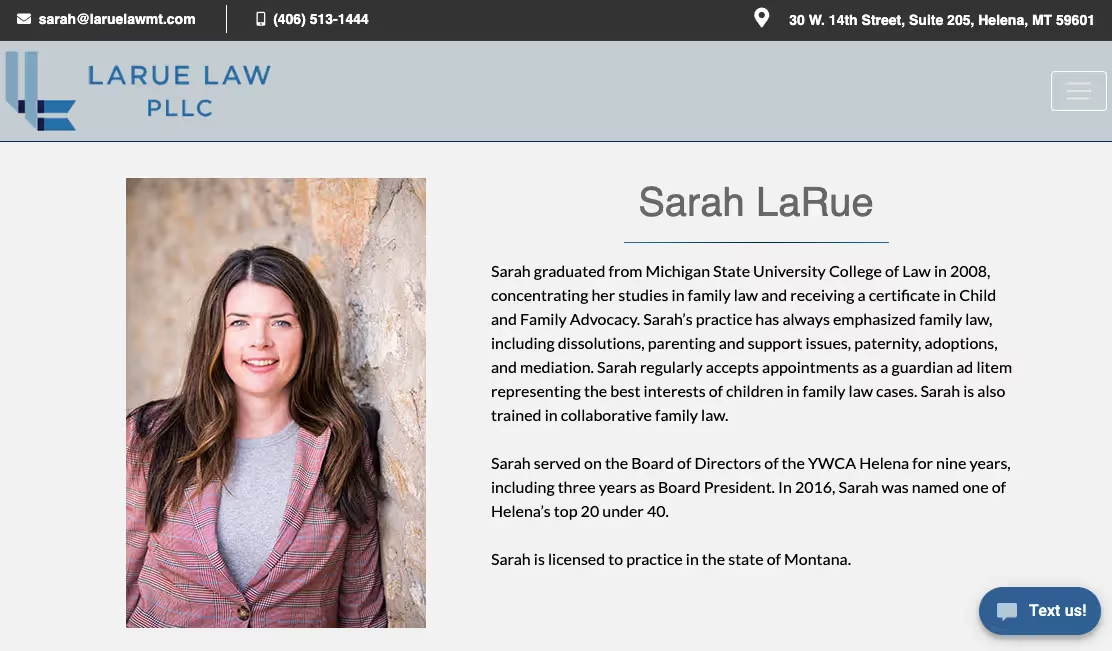
(Image: Sarah LaRue, LaRue Law PLLC)LaRue Law PLLC)In only a few paragraphs, Sarah LaRue's bio for LaRue Law PLLC accomplishes a lot efficiently. She immediately establishes her niche specialty in family law, signaling expertise to ideal clients.The bio highlights relevant credentials including her degree, certifications, and appointments as a guardian ad litem representing children's interests. This demonstrates her qualifications and commitment to clients.It also notes LaRue's community leadership with the YWCA Helena and award recognition among Helena’s top 20 under 40. Despite its brevity, the bio includes her education, experience, and community involvement. Most importantly, LaRue's bio conveys her commitment to providing personalized service and attention to clients. She focuses on how she can help readers, not just on qualifications.Key insights:
- Quickly establishes niche expertise in family law
- Efficiently highlights relevant credentials
- Demonstrates commitment to clients and children's interests
- Mentions leadership and awards, building credibility
- Emphasizes individualized client service and help
4Mary Ann Romero, Mary Ann Romero & Associates

(Image: Mary Ann Romero, Mary Ann Romero & Associates.)Mary Ann Romero & Associates.)Mary Ann Romero is an immigration attorney at Mary Ann Romero & Associates based in Albuquerque, New Mexico. This biography is a storytelling master class and highlights Romero's lifelong passion for immigration law stemming from her upbringing in a border town assisting Spanish-speaking families and others navigate services.Over the course of Romero's career, she has secured permanent status for thousands of immigrants seeking family unity, business opportunities, and protection. She handles cases related to family visas, deportation defense, waivers, victims of trafficking/violence/abuse, and citizenship.The bio emphasizes Romero's creative advocacy in earning clients' trust and securing lawful status. It notes her memberships in American Immigration Lawyers Association (AILA), Hispanic bar associations, her appointment to the NM Access to Justice Commission, and honors like Top 100 Lawyers.Romero provides outreach by presenting on immigration law developments. As a native Spanish speaker, she strives to disseminate accurate information to the immigrant community struggling with legal complexities.Key insights:
- Establishes extensive experience in immigration law over 17+ years
- Conveys passion for helping immigrant community stemming from personal background
- Emphasizes creative advocacy and commitment to earning client trust
- Notes professional memberships, commissions, and accolades
- Highlights outreach providing resources to the immigrant community
Tips for legal marketers at big law firms for creating uniform yet unique attorney bios
- Create firm-wide criteria that all attorney bios should contain (e.g. credentials, photo, practice areas, and contact info.)
- Curate a visual library of high-quality professional headshots attorneys can select from to incorporate photos uniformly.
- Establish protocols for regularly reviewing and updating attorney bios to maintain freshness.
- Develop a standardized biography structure and template attorneys can follow to ensure consistency.
- Allow reasonable creative license within the template for attorneys to customize selected sections highlighting unique accomplishments, memberships, publications, etc.
- Showcase specific practice niches, specializations, and thought leadership activities like speaking engagements and articles authored.
- Note credentials, awards, ratings, and recognitions that differentiate each attorney and build credibility.
- Encourage including personalized elements like videos talking about current issues or highlighting causes they are passionate about.
Crafting compelling attorney bios: template and example
An excellent bio template incorporates all the elements discussed to convey expertise and personality and instill client confidence. Here is an effective checklist that an attorney can adopt:
Professional headshot
Include a high-quality, approachable headshot to connect visually with readers. Avoid overly formal photos.
Full Name and credentials
Prominently display your full name, JD, Esq., or other credentials near the top.
Hook / achievement
Hook readers immediately by highlighting an impressive achievement.
Practice area specializations
Clearly convey your niche practice areas and sub-specializations using targeted keywords.
Biography summary
Provide a paragraph summarizing your academic and professional background. Mention admissions, clerkships, firms worked at, and years of experience.
Awards and accolades
Showcase meaningful credentials, ratings, certifications, and recognizable awards. Keep concise.
Organization involvement
Note contributions to key legal and community organizations. Be specific.
Personal details
Share interesting personal or biographical details judiciously if appropriate to humanize your bio.
Call to action
Include a friendly call to action for readers to request a consultation or access free resources.
Contact information
Prominently display your phone number, email address, and office location.
Example bio:

Maria Rodriguez, Esq.Secured over $5 million for clients in landlord-tenant disputes and housing discrimination cases.Housing Law and Tenant Rights AttorneyMaria's practice focuses on representing tenants in disputes with landlords and property management corporations. She also handles litigation around housing discrimination.After graduating from Columbia Law, Maria clerked for Hon. Elizabeth Davis of the New York Housing Court. She then joined the prominent civil rights firm of Johnson & Associates, handling impact lawsuits and advocating for affordable housing policies before joining her current firm.Recent awards
- American Bar Association Award for Excellence in Affordable Housing
- Hispanic National Bar Association Top Lawyers Under 40
Outside work, Maria enjoys spending time with her daughter Gabriella, trying new recipes, and volunteering at the community center. As a longtime resident of Brooklyn, she is dedicated to empowering tenants and improving housing access.Contact Maria for a consultation if you need legal advocacy regarding landlord disputes, discrimination, or other housing concerns.123 Sesame Street, Apt 4C / New York, NY 12345(555) 867-5309 / maria@housingequityformuppetscom
Setting the foundation of trust
First impressions establish a reputation. A law firm's website presents that critical first handshake with prospective clients. But bios must be more than digital resumes. Exceptional bios artfully blend credentials with personality. They motivate action while demonstrating competence. Bios that resonate drive conversations and conversions. Legal professionals can craft bios that truly connect by incorporating compelling content, sharpening structure, boosting engagement, and ensuring quality.Cultivating an authoritative yet approachable online presence is essential. And it all starts with the bio. With strategic bios as their foundation, law firms can maximize website engagement and forge lasting client relationships through expertise, approachability, and authenticity.
In a competitive market, law firms require robust legal software to streamline their marketing and client intake processes. Email campaigns to nurture and follow-up with prospects are a necessity. However, when running a busy practice, writing compelling marketing copy from scratch can’t (and shouldn’t) be a firm’s top priority.Although many legal professionals have strong opinions regarding the use of legal AI tools, a recent survey of lawyers found a large majority (82 percent) believe that generative AI can be readily applied to legal work, while 51 percent said that generative AI should be applied to legal work.
How is AI being used in the legal field?
AI in the legal industry streamlines processes, enhances efficiency, reduces costs, and improves decision-making. Here are some examples of AI in the legal sector:
Legal document generation
AI legal writing can generate legal documents by customizing templates based upon user input to reduce the time and effort required for drafting legal documents.
Document review
AI-powered algorithms can quickly review and analyze large volumes of legal documents, contracts, and case law to obtain pertinent information, identify patterns, and flag potential issues.
Legal research
AI legal research tools can assist lawyers in retrieving applicable case law and statutes, by scanning through extensive databases of legal documents, saving time and effort.
Virtual assistants
AI legal assistants can provide legal information and answer common legal questions to help law firms handle routine inquiries and provide better customer service.
Legal chatbots
Chatbots on law firm websites can be used to gather initial information from potential clients, helping firms assess whether they can take on a case and reducing administrative tasks.
Compliance and risk management
AI systems can monitor and analyze regulatory changes to help organizations stay compliant with evolving laws and regulations, assess risks, and propose mitigation strategies.
Predictive analytics
AI can predict case outcomes based on historical data and legal precedents to help lawyers and clients make more informed decisions about litigation strategies, settlement negotiations, and risk assessment.
eDiscovery
AI can be used to sift through massive volumes of electronic data during the discovery process in litigation to identify relevant documents and information crucial for legal proceedings.While AI offers numerous benefits in the legal field, it also raises ethical and regulatory concerns, particularly regarding data privacy, bias in algorithms, and the potential displacement of certain legal jobs. Legal professionals must carefully consider these issues as they integrate AI into their practices.
How AI will change the legal industry
Artificial Intelligence (AI) is poised to bring significant changes to the legal industry, transforming various aspects of legal practice and operations. So what is the future of AI in the legal sector? What are the challenges? Here's how AI is likely to impact the legal field:
- Increased efficiency: AI can automate routine and time-consuming tasks like document review, legal research, and contract analysis, allowing legal professionals to focus on more strategic and complex aspects of their work.
- Reduced costs: By automating tasks and improving resource allocation, AI can help law firms and legal departments reduce operational costs, to legal services more accessible and cost-effective for clients.
- Improved accuracy: AI algorithms can analyze vast amounts of data with a high degree of accuracy, reducing the risk of human error in tasks like document review and data extraction.
- Empowered legal professionals: AI tools can act as valuable assistants, helping lawyers and legal professionals perform tasks more efficiently and effectively, ultimately enhancing their productivity.
Overall, AI is likely to reshape the legal industry by augmenting the capabilities of legal professionals, improving access to legal services, and transforming the way legal work is performed, making it more efficient and cost-effective. However, it will also require ongoing adaptation, training, and careful consideration of ethical and regulatory issues.
How can AI amplify efficiency in the legal industry?
Major breakthroughs in automation and AI are fundamentally transforming the business of law. Lawmatics' new tool, LM[AI], incorporates breakthrough technology to boost law firm efficiency. No more staring at a blank screen - with one click, LM[AI] can draft fresh and professional email copy for you to edit and review.Tech-savvy firms that embrace such technology will likely be defined by their seamless client experience, integrated tech stack, and data-driven strategic approach, while those continuing to rely on legacy processes will be in danger of being left behind by firms on the cutting-edge of technology. To learn more about the power of LM[AI], request a demo today.
Subscribe to get our best content in your inbox
Ready to grow your law firm with Lawmatics?
Schedule a demo of legal’s most trusted growth platform.
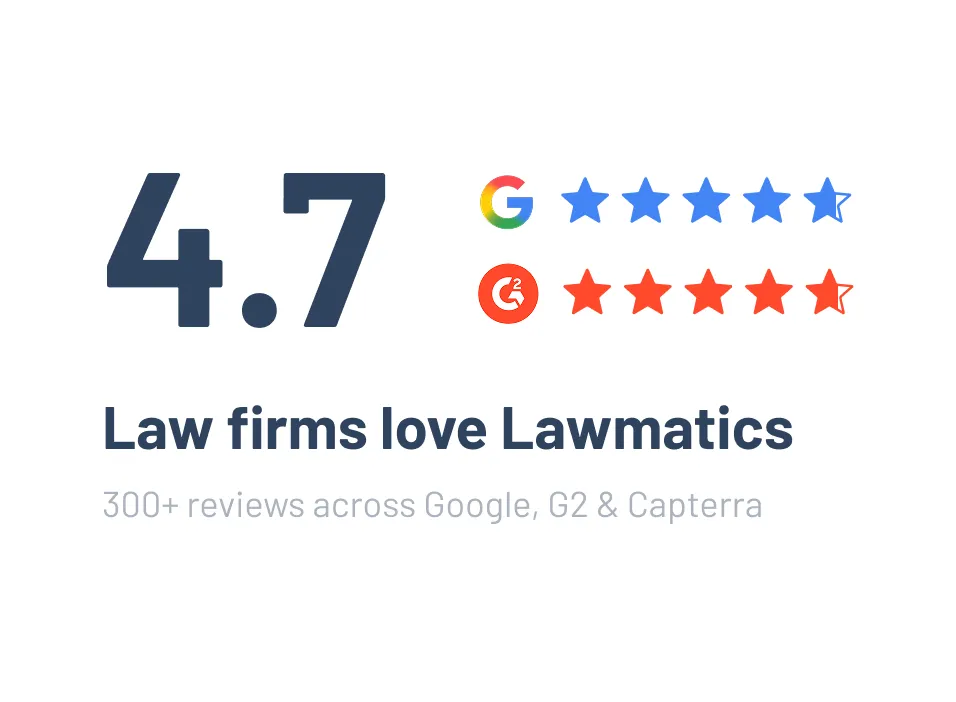




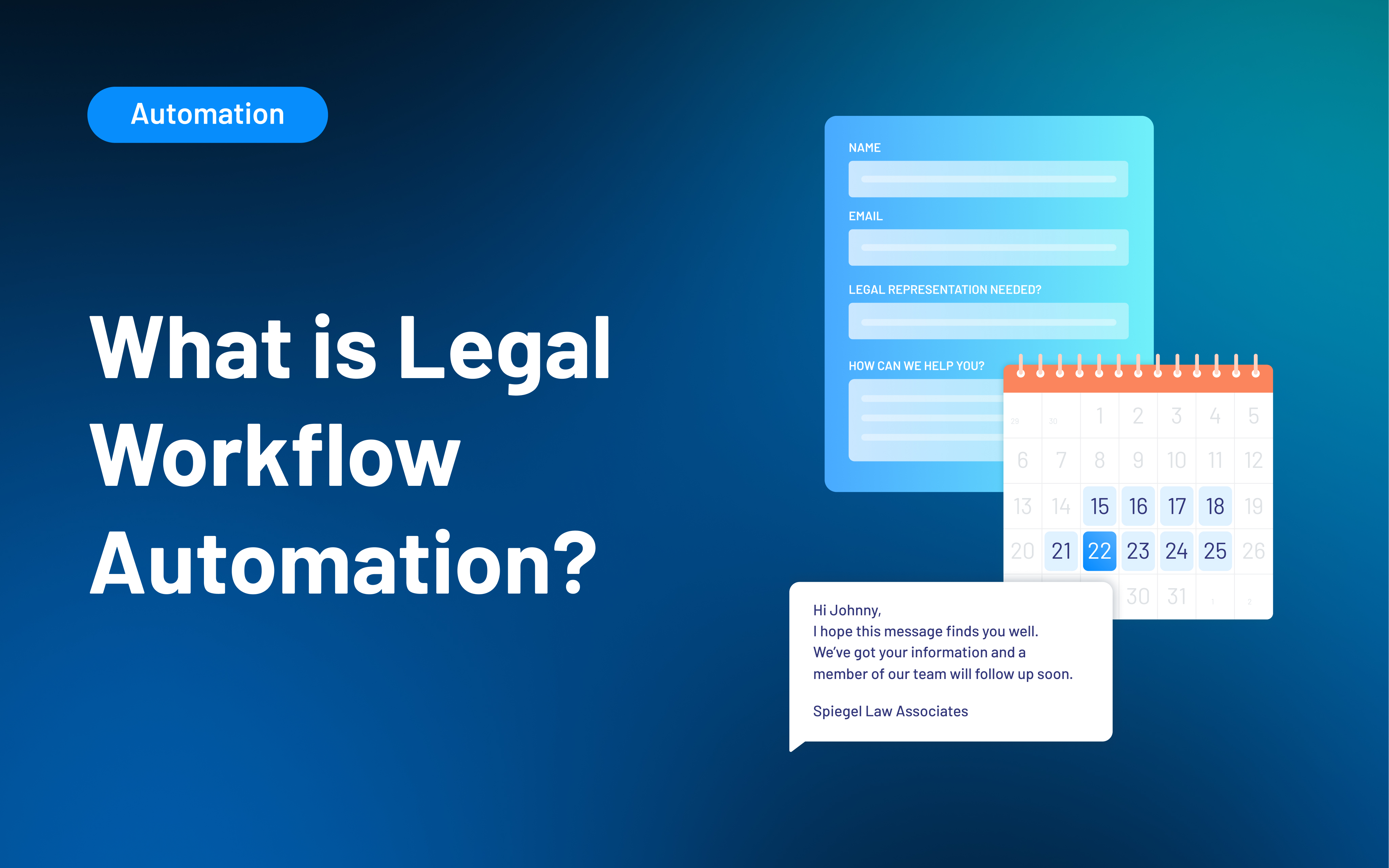


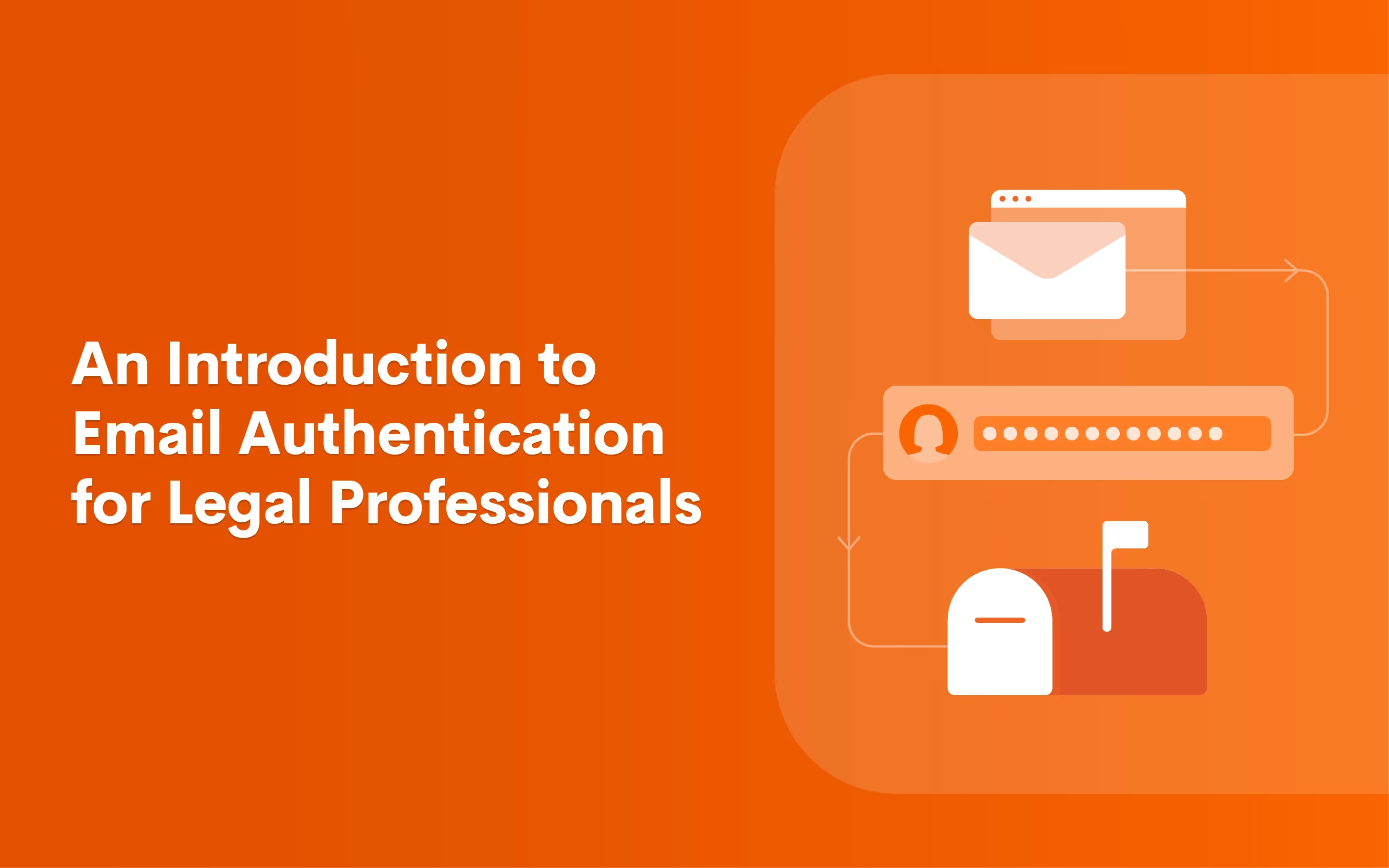
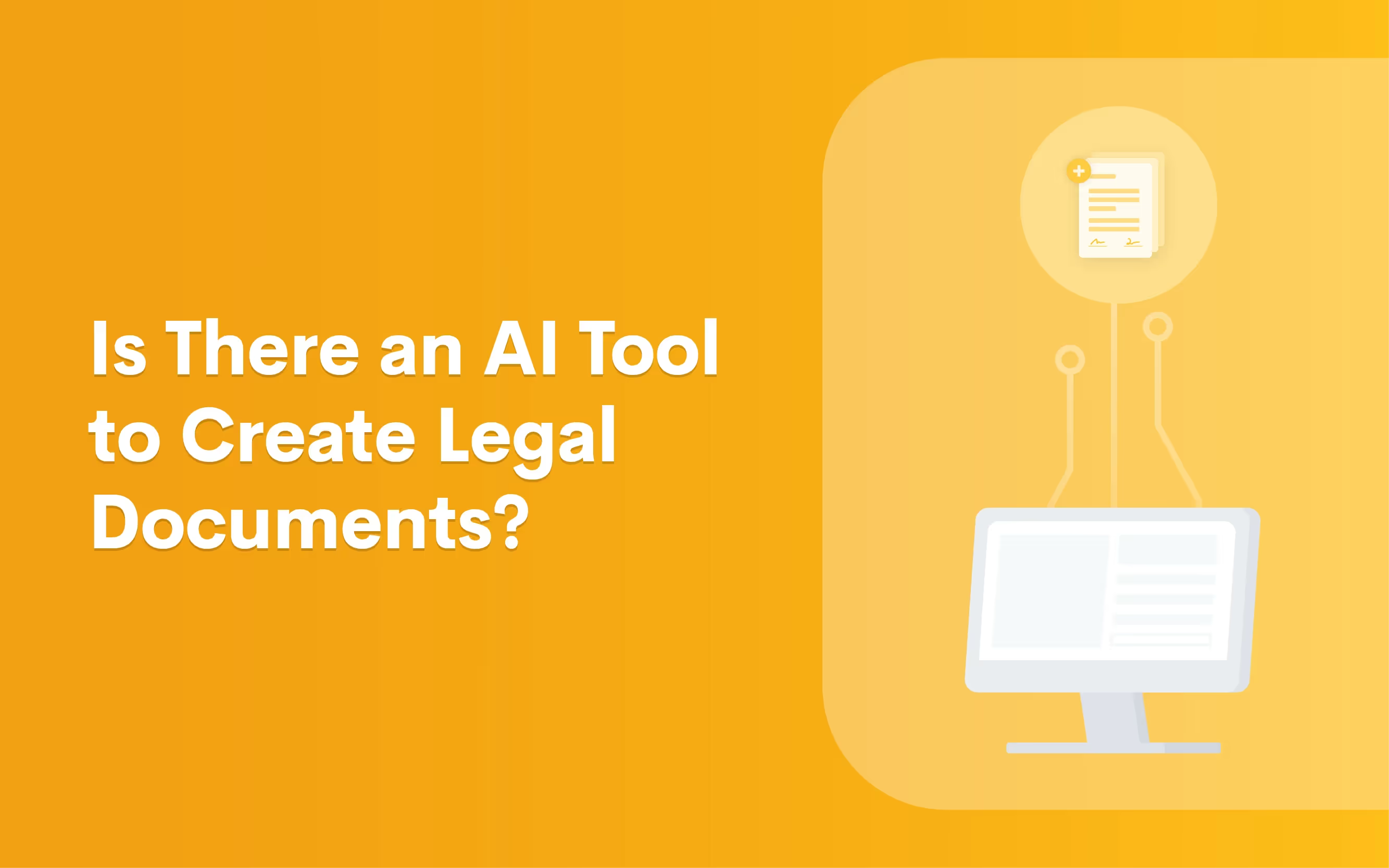

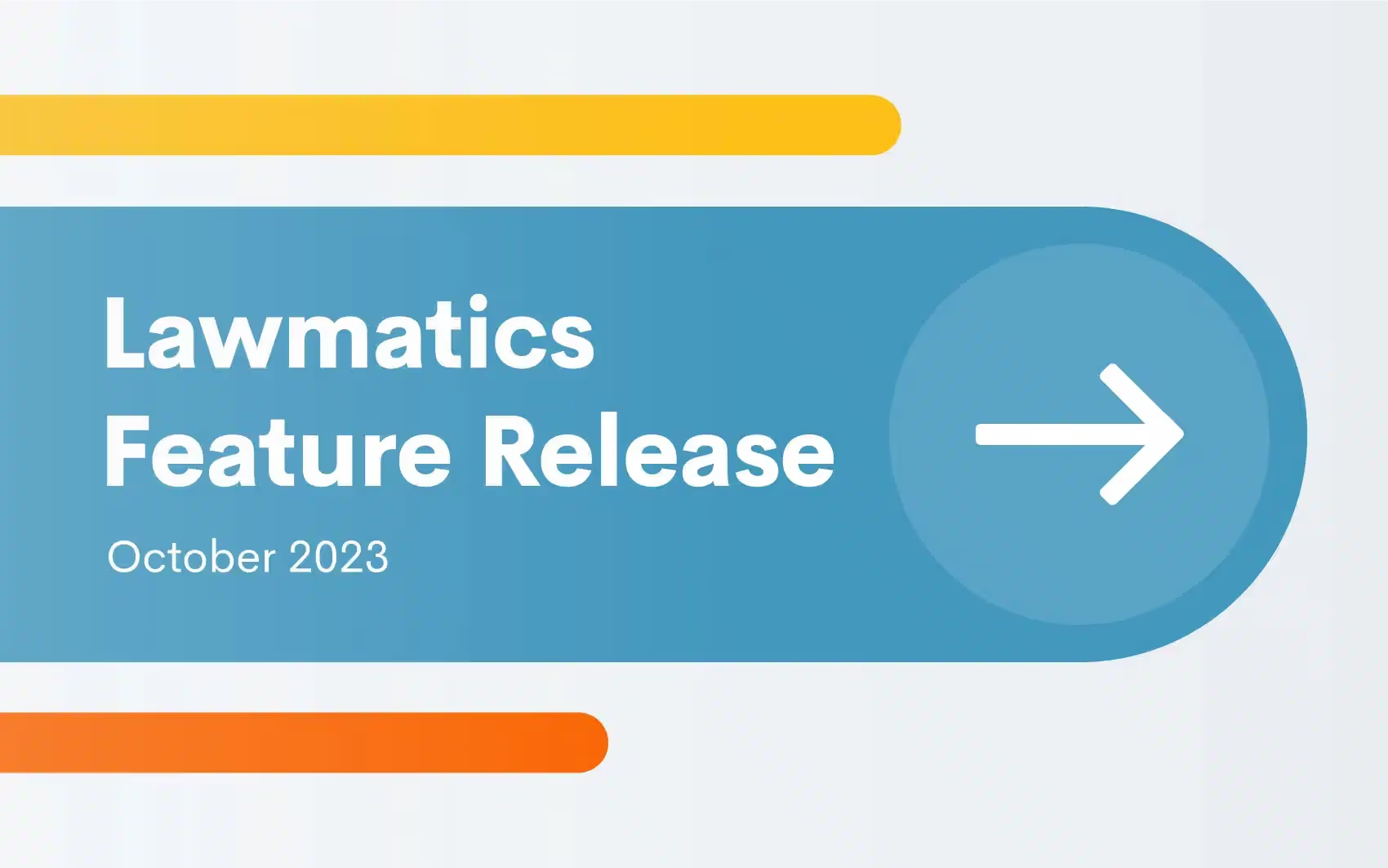
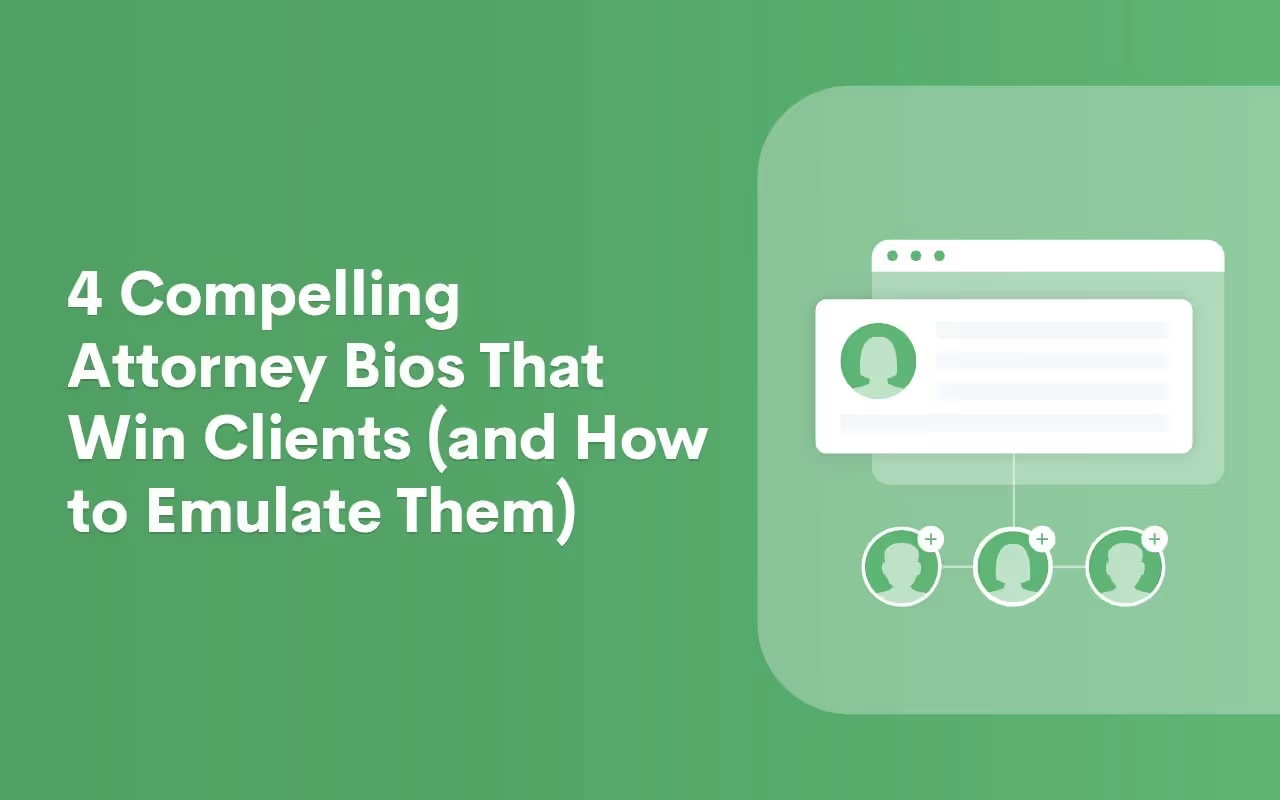

.avif)
.avif)

.avif)
